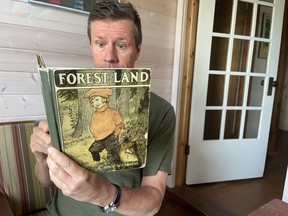Spears: Youth fiction was so much better a century ago
The characters were sassier, more alive and often conniving. And nary an elf lord in sight.

Article content
I follow some aspiring novel authors on X.com (#writers), and they talk about the struggle to sell stories.
They discuss who has found an agent. Who has sent a pitch to a publisher. Who has written how many words today on a WIP (work in progress.) And many deal in YA (young adult) fantasy and its sub-branches, romantasy and horromance.
The results are often rehashed Tolkien: story after story about elves, dark wizards, dragon-gods, sacred crystals and always in YA a strong and virtuous youngster, the type of kid Tom Sawyer would have tossed into the frog pond. Often some environmental theme. Art from a bad tattoo. I see all this in bookstores when I shop for young relatives.
But some writers of youth fiction a century and more ago did it so much better. Their characters were sassier, more alive and often conniving.
An easy example is Huck Finn, who meets two con men, a king and a duke. The king tells him: “Yes, my friend, it is too true — your eyes is lookin’ at this very moment on the pore disappeared Dauphin, Looy the Seventeen, son of Looy the Sixteen and Marry Antonette … the wanderin’, exiled, trampled-on, and sufferin’ rightful King of France.”
Then recently I rediscovered Forest-Land, a treasure from 1905 in which two children discover talking forest creatures.
Peter and Geraldine on their own are bland, but the trees and animals they find are quick-tempered, snooty, rude and delightful. (Geraldine has a briefly vicious moment when she threatens to bring an axe to deal with two squabbling trees, but that doesn’t last.)
Take the spider they meet, for instance, which imitates a flower and then traps flies. Peter tells him this is unfair until the spider asks him about sticky flypaper in the family’s stable.
“It’s wasteful, too,” says the spider, because the children don’t eat flies. ” ‘But I do,’ continued the flower-spider, quietly biting off the fly’s wings and beginning luncheon.”
There’s a trio of beetles that are always erupting in anger and biting anything within reach. A bumble-bee that uses slang, which the children are forbidden to do.
An ant is sarcastic and angry.
“Do you eat eggs?” he asks.
“Why yes, we eat eggs,” one of the children says.
“Ants’ eggs?” shrieked the ant in a fury.
“Nonsense,” said Peter with a shudder. “We only eat birds’ eggs.”
“That’s what I always thought,” the ant says, with a sneer. “Indoor folks are a sort of snake.”
You won’t find that in YA.
One happily scornful creature snaps at the children: “As the prig is bent, so is the freak inclined!” (Look it up, but substitute “twig” and “tree” to get the original. Could you write that for children today?)
There’s a woodcock, a small game bird, proud that if a hunter catches him he will go out in style, served on toast.
But the best is the fox, killing farm hens and covering himself with a flood of lies. He’s not evil; he’s hilarious. Also Trumpian, as the fox blames the hen for attacking him. She “seized me in her terrible beak and ran off to the woods with me.” Exit hen.
“Can’t you tell the truth?” Geraldine asks.
“How is it done, children? How does one tell the truth?”
They answer and he replies: “That does not sound attractive. If a thing is so, why repeat it? That would be tiresome.
“It’s much more interesting to say a thing that isn’t so.”
Another writer from the same period (a satirist who wrote under the name Saki and was killed at the Somme in 1916) reminds us that preachy and formulaic children’s stories were as unappealing then as now.
In his short story The Toys of Peace, two moralizing Brits replace their children’s toy soldiers with toy civilians: prime ministers, Florence Nightingale and the like.
The kids, however, transform them into invading French soldiers, splashing red ink for blood. “The soldiers rush in and avenge his death with the utmost savagery. A hundred girls are killed — here Bertie emptied the remainder of the red ink over the building and the surviving five hundred are dragged off to the French ships. ‘I have lost a Marshal,’ says Louis, ‘but I do not go back empty-handed.’ ”
Forest-Land, by Robert W. Chambers, is rare and expensive but still available online, and there’s not a cheap moral in it. It shows us that our ancestors had clearer vision than we give them credit for. And not a single elf lord or magic crystal in sight.
Tom Spears is a longtime Ottawa news reporter.














Postmedia is committed to maintaining a lively but civil forum for discussion. Please keep comments relevant and respectful. Comments may take up to an hour to appear on the site. You will receive an email if there is a reply to your comment, an update to a thread you follow or if a user you follow comments. Visit our Community Guidelines for more information.